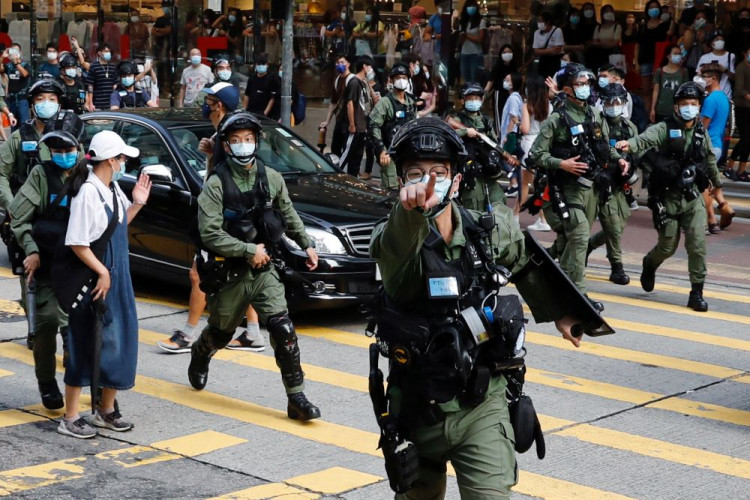Hong Kong police have arrested 19-year old activist leader Tony Chung outside the U.S. consulate where they say he was going to seek asylum from protest-related charges.
Officers from a new unit enforcing the Beijing-backed National Security Law took Chung into custody at a coffee shop down the street from the consulate at about 8 a.m. Tuesday, according to CCTV images from the scene. Two plain-clothes police officers can be seen taking the teenager away.
Chung was first arrested in late July for inciting secession under the new National Security Law, which has been roundly criticized abroad for stifling free speech.
"The purpose of the National Security Law is to quash freedom of speech and allow arbitrary arrests," Hong Kong citizen Nathan Law said. He fled the city in July.
Members of the now-defunct Studentlocalism group, a student-run political organization, first raised the alarm early Tuesday morning. They reported via Facebook that Chung had gone incommunicado only moments after saying people were tailing him.
As word of Tony Chung's arrest spread, police also took fellow Studentlocalism members Yanni Ho and William Chan into custody Tuesday afternoon for making subversive posts to social media. Like Chung, 17-year old Ho and 21-year old Chan were first arrested July 29 under the security law for allegedly inciting secession.
"The three arrestees including Tony Chung have accepted legal assistance," the disbanded activist group said in a statement Tuesday evening.
Ho and Chan were released from custody after midnight early Wednesday morning with no modifications to their original charges according to the police. Chung remains unaccounted for.
A Rise In Arrests, Asylum Seekers
Since protests related to the withdrawn Extradition Bill kicked off in June last year, police have arrested 10,140 people.
Roughly a fifth of those arrested face charges - many related to violations of the National Security Law, which are investigated by a special police unit from the mainland.
The U.S. has come down on Hong Kong officials for passing the law - subjecting the chief executive and head of police to sanctions.
American diplomats turned away four youth activists Tuesday who visited the U.S. consulate seeking asylum in the hours after Chung's arrest.
Requesting refuge at a foreign embassy is one of several avenues being pursued by young Hong Kong activists who fear they will be sentenced to years in jail.
Some have uprooted their lives and moved overseas. Canada accepted its first asylum seeking couple from Hong Kong last month.
"Canada remains a refuge for prodemocracy asylum seekers from Hong Kong," Vancouver parliamentarian Dr. Hedy Fry said. "I am deeply troubled by the growing cases of human rights abuses taking place there."






